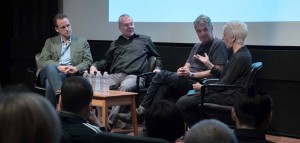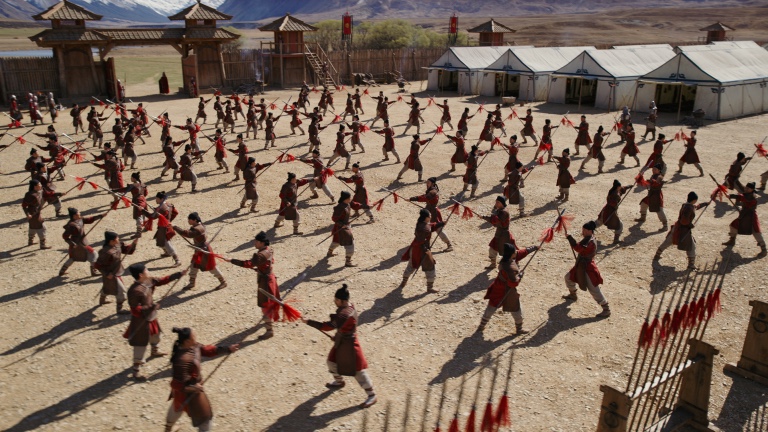 One of the more agreeable and colorful quotes coming out the half-day workshop held in partnership with the Producers Guild and Society of Camera Operators echoed from the tongue of cinematographer John Tull (Braveheart, Iron Man 3 ), “When I hear I will fix it in post, it makes me absolutely fucking crazy.” The room roared with laughter and applause. He’s right.
One of the more agreeable and colorful quotes coming out the half-day workshop held in partnership with the Producers Guild and Society of Camera Operators echoed from the tongue of cinematographer John Tull (Braveheart, Iron Man 3 ), “When I hear I will fix it in post, it makes me absolutely fucking crazy.” The room roared with laughter and applause. He’s right.
On Saturday, Dec. 12, the two guilds addressed the roles, relationships, and importance of camera operators as they relate to cinematographers, directors, producers, and other key crew members. Moderated by Debra Kaufman, three different panels were presented with a Q&A following. There was even a surprised guest, camera operator Colin Anderson, who recently finished the new Star Wars film. He couldn’t talk much about it, but did suggest it’s a must see in 2D rather than 3D.
Back on topic. Why this discussion is so important is because the camera operator is no longer a mandatory budgetary line item for producers shooting in the U.S. Sound crazy? It kind of is. While most producers still consider a separate camera operator an important part of any budget, discussions like these help clear up confusion and cement the importance of a camera operator to on-set workflow.
The first panel, “How Did You Get that Shot?!” – SOC members Stephen Campanelli (Sully, American Sniper) and Steve Fracol (Scandal, Sons of Anarcy) took stage to show various sequences of their work. After, they discussed the storytelling behind them on a creative and technical level. “It’s important to use your imagination,” said Fracol. “Yes, you’ll always be up against the clock, but if you take that extra minute to look everything over, you might be able to come up with a better way to visually tell your story.”
“The role of the Operator and the Cinematographer” panel keyed in on exactly what you might imagine – the relationship between cinematographer and camera operator. It also tied in how producers can work with cinematographers in order to stay on budget. Daryn Okada, ASC (Scandal, Mean Girls) and John Toll sat in to discuss the importance of a camera operator to producers. “In television, operators are sometimes more important than the DP,” admited Okada. “On Scandal, when we have a new director coming in, camera operators know the style of the show more than anyone. They know how to get you in and out of the story. When I first came in on Scandal, I tried treating it like a feature, and you can’t do that. I see directors trying to do the same. You don’t have the time as you would on a feature because you’re shooting eight pages of material a day. While I’m over at the monitor making sure the look of the show is where it needs to be I trust my operators to get the shot.”
On the feature side, Toll stated a similar statement. “We have more time setting up in the feature world, but with the digital technology, as a cinematographer, I have had to retrain my eye to know what the image is going to look like. I was shooting film for such a long time, you learn how light is going to treat it. In the digital world, I have to be by a monitor or by the Digital Imaging Technician to learn how the image is being interpreted instead of being by or operating the camera. With these digital cameras, you may have more control over the image, but you almost need to protect what you intended the image to look like almost before it leaves the set.” Both Okada and Toll agreed without a proper team in place that includes a camera operator, the efficiency on set could suffer.
“Valuable Insights from Producers, Directors and Assistant Directors” was the last panel which highlighted the relationship dynamics between producers and crew and how the benefit of camera operators can benefit the production. Producer Stan Wlodkowsi (Story of Your Life, Focus), producer/actor/director Tom Verica (How to Get Away with Murder, Scandal), and producer Daniel Lupi (Bridge of Spies, Her) spoke about a lot of different subjects, but the one thing they did all agree upon was that any budget depends on the director and the needs of a project. “For me, I always put in a line item for a separate camera operator rather than to look for a cinematographer who also operates,” said Wlodkowski. “I’ll usually hire the cinematographer and then ask him what kind of camera crew he wants. More often than not they will have a list in mind or have them even hired before I even know their names.”
Verica, who has a unique perspective being a producer on Scandal and an actor on How to Get Away with Murder, said, “The best situation is when the cinematographer and operator already have a great relationship. They’ll be a lot more efficient on set, and in television, that can be a very good thing.” Lupi echoed the same sentiment, “When you start “hosing” through the day trying to get as much coverage as you can, you become less precise in the art of filmmaking. Good operators are watching the story and a director like Paul Thomas Anderson will do thirty takes one day and then come back and it all over again. It takes a skilled operator to get through something like that. When you have a great operator and a great cinematographer working together, the art of filmmaking won’t suffer.”





